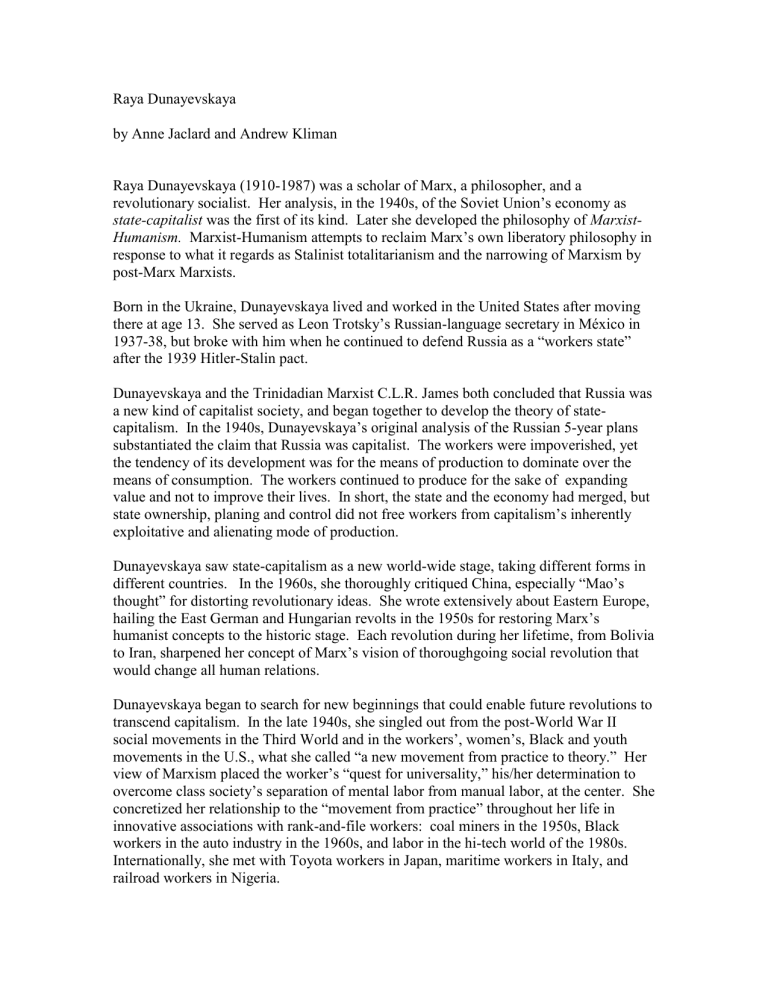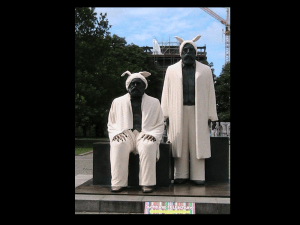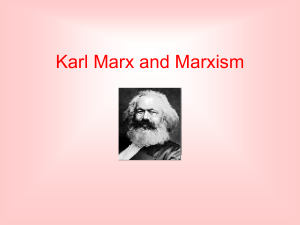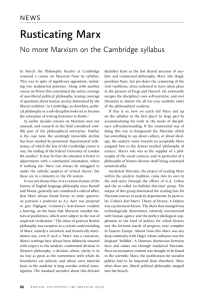RD Trotta

Raya Dunayevskaya by Anne Jaclard and Andrew Kliman
Raya Dunayevskaya (1910-1987) was a scholar of Marx, a philosopher, and a revolutionary socialist. Her analysis, in the 1940s, of the Soviet Union’s economy as state-capitalist was the first of its kind. Later she developed the philosophy of Marxist-
Humanism. Marxist-Humanism attempts to reclaim Marx’s own liberatory philosophy in response to what it regards as Stalinist totalitarianism and the narrowing of Marxism by post-Marx Marxists.
Born in the Ukraine, Dunayevskaya lived and worked in the United States after moving there at age 13. She served as Leon Trotsky’s Russian-language secretary in México in
1937-38, but broke with him when he continued to defend Russia as a “workers state” after the 1939 Hitler-Stalin pact.
Dunayevskaya and the Trinidadian Marxist C.L.R. James both concluded that Russia was a new kind of capitalist society, and began together to develop the theory of statecapitalism. In the 1940s, Dunayevskaya’s original analysis of the Russian 5-year plans substantiated the claim that Russia was capitalist. The workers were impoverished, yet the tendency of its development was for the means of production to dominate over the means of consumption. The workers continued to produce for the sake of expanding value and not to improve their lives. In short, the state and the economy had merged, but state ownership, planing and control did not free workers from capitalism’s inherently exploitative and alienating mode of production.
Dunayevskaya saw state-capitalism as a new world-wide stage, taking different forms in different countries. In the 1960s, she thoroughly critiqued China, especially “Mao’s thought” for distorting revolutionary ideas. She wrote extensively about Eastern Europe, hailing the East German and Hungarian revolts in the 1950s for restoring Marx’s humanist concepts to the historic stage. Each revolution during her lifetime, from Bolivia to Iran, sharpened her concept of Marx’s vision of thoroughgoing social revolution that would change all human relations.
Dunayevskaya began to search for new beginnings that could enable future revolutions to transcend capitalism. In the late 1940s, she singled out from the post-World War II social movements in the Third World and in the workers’, women’s, Black and youth movements in the U.S., what she called “a new movement from practice to theory.” Her view of Marxism placed the worker’s “quest for universality,” his/her determination to overcome class society’s separation of mental labor from manual labor, at the center. She concretized her relationship to the “movement from practice” throughout her life in innovative associations with rank-and-file workers: coal miners in the 1950s, Black workers in the auto industry in the 1960s, and labor in the hi-tech world of the 1980s.
Internationally, she met with Toyota workers in Japan, maritime workers in Italy, and railroad workers in Nigeria.
At the same time in the late 1940s, she turned to a study of the Hegelian dialectic that led her to see a “movement from theory to practice.” Her 1953 letters on Hegel’s Absolutes mark a breakthrough in explicating the “power of negativity” as the source for creating that unity of theory and practice that can lead to a new human society.
Throughout the rest of her life, she argued that the whole of Marx’s work, including his critique of political economy, was informed by his humanism and by the “dialectic of negativity” of the German philosopher G.W.F. Hegel. According to Dunayevskaya, it was necessary to reclaim these aspects of Marx’s Marxism –– which had been neglected by post-Marx Marxism –– in order to recreate it as a philosophy of human liberation once again.
As an appendix to her first book, Marxism and Freedom (1958), she included the first
English translations of Marx’s 1844 “Private Property and Communism” and “Critique of the Hegelian Dialectic,” and of Lenin’s “Abstract of Hegel’s Science of Logic .” The book contains an analysis of Russia as state-capitalist, a discussion of Marx’s 1844 Economic-
Philosophic Manuscripts and their relation to Capital , and a description of recent workers’ movements against automation. In the preface to this work, Herbert Marcuse wrote, “Dunayevskaya’s book goes beyond previous interpretations. It shows not only that Marxian economics and politics are throughout philosophy, but that the latter is from the beginning economics and politics.”
Drewk – pls write something here about her unique view of Marx: relation of Science of
Logic to Capital; relations of production, not market, historic specificity of the categories of Capital, Vol II, RL critique; domination of dead over living labor (sees Russia in terms of c/v
Dunayevskaya saw state-capitalism as a new world-wide stage, taking different forms in different countries. In the 1960s, she thoroughly critiqued China, especially “Mao’s thought” for distorting revolutionary ideas. She wrote extensively about Eastern Europe, hailing the East German and Hungarian revolts in the 1950s for restoring Marx’s humanist concepts to the historic stage. Each revolution during her lifetime, from Bolivia to Iran, sharpened her concept of Marx’s vision of thoroughgoing social revolution that would change all human relations.
The four books Dunayevskaya wrote during her lifetime were published in English in the
U.S. and elsewhere into more than a dozen languages. The greatest number of translations have been into Spanish, reflecting the dialogues she conducted with activists and writers in Latin America. She made extensive studies of Latin American revolutions, from Bolivia to Cuba and from Chile to Central America, and corresponded with thinkers such as Argentina’s Silvio Frondizi and Mexico’s Jose Porfirio Miranda. Her books were published in Mexico, beginning with Marxismo y libertad (Juan Pablos Editor).
Filosofia y revolucion: De Hegel a Sartre y de Marx a Mao (Siglo Veintiuno Editores) includes a discussion of Marx’s
Grundrisse as well as late 20 th
century economic
development. Rosa Luxemburgo, la liberacion femenina y la filosofia marxista de la revolucion (Fondo de cultura economica) explores Marx’s late writings, including the
“Ethnological Notebooks” in which he examined possible non-capitalist, non-European paths to new societies building upon certain Third World and archaic egalitarian gender and property relations. Liberacion femenina y dialectica de la revolucion: tratando de alcanzar el furturo is a collection of 35 years of essays in which women around the world appear “as reason as well as force of revolution.”
In the 1980s, Dunayevskaya sharpened her critique of those she called “post-Marx
Marxists, beginning with Engels,” for failing to comprehend Marx’s philosophy as a totality. Their narrowing of Marx’s philosophy, she felt, left them unable to re-create it in order to fit the needs of different historical periods. In her final years, she turned her attention to the problematic of the relation between philosophy and organization, leaving extensive notes for an unfinished work.
Since her death, a collection of her writings entitled The Marxist-Humanist Theory of
State-Capitalism was published, and forthcoming is a collection of essays on dialectics entitled The Power of Negativity.
In addition, some 15,000 pages of her writings are on deposit at the Wayne State University Archives of Labor and Urban Affairs in Detroit,
MI 48202, and are available on microfilm. The organization she founded, News and
Letters Committees, publishes unpublished writings and talks by Dunayevskaya in its monthly journal (www.newsandletters.org).








